By Gabriela Silva Ponte
Toronto Metropolitan University’s (TMU) Model UN team may be climbing up the global ranks after their performance at the North American Model UN (NAMUN) conference, which was held from Feb. 22 to 24.
The conference was hosted by the University of Toronto (U of T) and saw several Met MUN—the team’s official name—general members and TMU students Owen Webbe and Asia Vrazalis win awards.
Model UN is a simulation of the United Nations council where thousands of students debate policy, its implementation and global and current affairs, according to the simulation’s website. Participants play the role of ambassadors from a variety of regions to discuss their assigned country’s interests on a global level, whether those be real or fictional events.
“Model [UN] is supposed to…prepare [students] for their lives as diplomats. A lot of [them] do want to go into the diplomatic field,” said Met MUN vice president and second-year TMU commerce, accounting and finance student Reza Pournaji.
There are a variety of positions each delegate can hold in crisis committees, historical committees, general assembly and more.
“[Conference organizers] give us positions based on the level of experience that the delegate has,” said Pournaji.
Best Delegate awards
Webbe, who is a second-year civil engineering student at TMU, said winning Best Delegate at NAMUN was surprising, considering he was placed into his position just three days before the conference.
He said it was “an experience unlike anything before.”
Webbe’s award comes with a gavel, which contains a metal plate where his role is engraved.
“When [others] win these, you always see how happy and [accomplished] they are…Usually when you reach the end of your Model UN career, when you’re about to graduate, you want to get one of these,” he said.
He said the win showcases his progression. “I can debate practically anything with any sort of preparation time.”
And this isn’t Webbe’s first award in the past few months. According to Pournaji, he also won an honourable mention award at McMUN**.
Honorable Mention award
At NAMUN though, it was first-year business management student Vrazalis who took home an honorable mention award.
She said she doesn’t think she would have won the award if it weren’t for speaking to Webbe, Pournaji and Met MUN director of external affairs, Shervin Akhlaghi.
“The encouragement and the votes of confidence were just beyond fantastic,” she said.
“When you do hear your name called and your team’s up cheering for you, there’s nothing more rewarding than that,” Vrazalis added.
Pournaji said Met MUN’s delegates all had a seamless experience at the conference. “It was a great experience for them and U of T had a great support system for the new delegates.”
Vrazalis, Webbe and fellow Met MUN member John Ziadeh all agreed on the positive atmosphere at the event.
“From committees, to socials, to our chairs, it was just a lovely experience,” said Vrazalis.
Ziadeh echoed this sentiment. The second-year computer engineering student said the scale of NAMUN and the executives pushed them to be more prepared for the event.
The team also won awards for two of their ‘position papers’—which delegates must write prior to entering a conference.
Pournaji said they helped these group members craft their reports during their training.
“We gave them a lot of support to write the paper because they’re a little new, they [had] only been to two conferences before,” he said. ”They did an amazing job. They absorbed all of our advice really well and they did better than what we could have done ourselves.”
Akhlaghi, who is also a third-year engineering student at TMU, said there were some “hiccups” during the preparation process. He said they sought out advice from their Concordia University peers—who are the top-ranked Model UN team in Canada—along with the U.S. Military Academy team to adjust their training program.
“We took [that] advice into our curriculum and we really focused on live simulations, timed resolution writing, timed directive writing,” he said. “When we got to the last two training sessions before NAMUN, we really did a whole lot of research on each position that our delegates were in,” said Akhlaghi.
Pournaji expressed the team’s excitement with their performance at NAMUN.
“We were excited, because it was looking real bad. We weren’t winning any awards and we were like, ‘oh my god, what if we don’t win awards,’” he said. “We’ve never been so happy in a conference before.”
Met MUN
Met MUN, specifically, includes great people and camaraderie, Pournaji and Akhlaghi agreed.
“I had no friends when I came to university,” Pournaji said. “I came in contact with our team and the people, the community, was really great. And it was super supportive.”
Webbe described the club as purely educational.
“You’re literally learning about how these types of decisions that impact people all over the world are made and how to lobby, how government institutions work,” he said.
Vrazalis, however, credited the team and the conferences for some of the best friendships she’s built.
“If we also look at it from the experience side, it is incredibly rewarding,” she said. “I’d say it’s a place where a bunch of friendships are built.”
Ziadeh joined Model UN back in high school. He said Met MUN has helped him develop some of the skills he learned even further.
“The only reason I joined back in ninth grade of high school was because I wanted to improve my public speaking. I was very afraid to get into public speaking…[but then] I fell in love with it,” he said. “So for me, it doesn’t matter what you’re studying. It doesn’t matter who you are, or what level of information about politics in the world you have. Just look at something you want to learn, want to gain…you’ll [most likely] find it here.”
Pournaji said the main thing he gains is meeting different people and getting to know their perspectives.
The group’s demographic encompasses a variety of students from different faculties and years.
According to the team’s latest survey, Pournaji said 25 per cent of Met MUN’s delegates are in the Ted Rogers School of Management, 10 per cent are in The Creative School, 30 per cent are in the Faculty of Arts, 10 per cent are in the Faculty of Science, 10 per cent are in the Faculty of Community Services and 15 per cent are in the Faculty of Engineering and Architectural Sciences.
Pournaji added that more than 50 per cent of their students are in their first and second years, 30 per cent are in their third year and 20 per cent are in their fourth year.
The credit for this, Pournaji said, goes to Akhlaghi, who previously held the position of director of social media and marketing.
“He would make a lot of content, he would do a lot of collaborations and reach out to other student groups. He did all the vlogs of our conferences that we went to and a lot of students discovered us through their explore page,” said Pournaji.
He added that many of their members joined the team through TMU’s 2023 Orientation Week.
“Orientation Week was huge for us…We got a lot of people joining,” Pournaji said. “If people signed up, they did get a cookie. We spent a lot of money on cookies. But the important thing is our retention was really high.”
METMUN conference
Last year, Met MUN held a conference similar to NAMUN at TMU.
METMUN 2023 was held from Nov. 17 to 19, a two-day period which Pournaji said they started planning back in May.
TMU students paid $50 for attending the conference, while non-TMU delegates paid $60. The team earned just over $4000 from the event.
The conference saw a number of guest speakers, from Member of Parliament Ali Ehsassi, to former Member of the House of Commons of Canada Peggy Nash.
“We did a lot of bookings on Explore TMU,” Pournaji said. “[Akhlaghi] had a lot of [sleepless nights] trying to get in contact with our guest speakers.”
Met MUN was also allowed to give academic credit to students who participated in METMUN and are also part of the Politics and Governance department.
“[Students] could choose to write an essay for the course they’re in, or they could choose to attend our conference and write a position paper and have their position paper graded for credit,” Pournaji said.
The individuals who went to the conference for credit were able to get in free of charge.
Pournaji also said Met MUN collaborated with Red Bull after he convinced the manager of the Red Bull Gaming Hub at TMU, Geoffrey Lachappelle, to allow them to use the room at a discounted rate.
“We got [free] Red Bull for the whole conference,” Pournaji said.
He added that although delegates usually have to bring their own computers, everything was provided to them this time.
“It was a really innovative move by us because there’s never been a crisis committee that I’ve heard of that’s been in a gaming arena with gaming computers,” he said.
The funding for their catering came from the Toronto Metropolitan Students’ Union (TMSU), Pournaji said.
“I’ve never been [to] a Model UN conference where they provide food for all the days. Usually they give you a voucher or discount code for a nearby restaurant, but we provided the food for everyone,” he said.
They ended off the weekend with a social event at the Madison Avenue Pub.
“People loved that,” Pournaji said.
Met MUN general members agreed.
Ziadeh said everyone, from participants from other schools to Met MUN executive members who planned the conference, were friendly and easy to get along with.
Webbe pointed out that last year’s conference was only the second Met MUN has held since the pandemic.
“A lot of work was done to try and make it bigger than what we had done in previous years,” he said.
METMUN was Vrazalis’ first ever Model UN conference. She said her preparations surrounded getting to know the expectations of Met MUN executives.
“The action committee session was wonderful, you met so many people, it was a great networking opportunity,” she said.
She gave some tips for the future, including making the conference as long as possible and getting more schools involved.
Funding issues
Although the event was ultimately successful, Pournaji said their budget was $0.
“We had no funds because a lot of people during [the COVID-19 pandemic] were struggling and they couldn’t come to a lot of conferences,” he said. “So we used a lot of our trust fund to subsidize people to go and to participate in conferences.”
He said the funding avenues they took helped them raise a total of $5000 for the conference.
“A lot of it was from the TMSU. The catering cost a lot of money. I reached out to Marina [Gerges], the previous president and we planned everything out,” Pournaji said. “She was super interested in helping us out with the conference.”
Student groups under the TMSU receive $600 per semester, according to their website. Pournaji said the team used this for their spending on the Red Bull Gaming Hub.
Pournaji said he believes this is nothing compared to McGill University’s conference budget, which he said totalled roughly $100,000 for McMUN*.
He also said the money they raised at METMUN is currently being used to subsidize those who are in need of financial assistance so that they can attend conferences.
“I feel like we’re a little underfunded for the amount of plans that we have, the amount of members that we have,” Pournaji said. “I’m really proud of ourselves for being able to do stuff that we do with the little budget we have.”
The Eyeopener reached out to the TMSU but the union did not comment on this.
Pournaji added that every year, the team tries to add $2000 to their trust and savings account so they “don’t run out.”
Additionally, Pournaji said the merchandise the team possesses was bought with each person’s individual money, rather than the team’s funds.
“People were so passionate about the club that they were willing to spend their own money for the merch,” he said.
He added that at conferences, most of the hotels they need to book are paid for by delegates themselves, rather than with Met MUN funds.
Pournaji explained that when the team attended McMUN—McGill University’s Model UN conference—Met MUN subsidized $200 per person for the entire trip.
“So it was basically a $200 discount for them…but we do still spend a lot of our own money to go on these trips,” he said. “Students are willing to do that because of how passionate they are. And that’s why I feel like we’re kind of underfunded, just because we could be doing a lot more and we could be bringing a lot more people, but they just can’t afford to come.”
Akhlaghi said the team is not only doing this for themselves but also for the school—to give it a better name and to pay them back for how much they’ve helped.
A look ahead
Last year, Met MUN placed in the top 100—between 94th and 96th—in the global ranking, which includes schools such as Harvard University and Brown’s College, Pournaji said. The most centralized ranking is Best Delegate, which Pournaji said is based on a point system in circuit committees.
“No one really knows about their weighing systems, it’s just their own thing. [But] they do the ranking based off of the awards that universities won,” he said.
He said Met MUN’s—then known as Ryerson Model UN—best ranking was top 50 in 2016. “I think we were ranked higher than Princeton [University] and Yale [University].”
But he added that the pandemic really slowed things down and meant they weren’t even in the top 100.
Akhlaghi and Pournaji are already doing the math to see where they’ll place this year. They’re hoping to reach a global ranking in the top 50.
“From the rough calculations we’ve made, worst case scenario, [we place] top 75. Best case scenario, [we place] top 50. Again, getting us back into the position that we were in [in] our glory days. We’re really hopeful about that,” Pournaji said.
The ranking results are to be released in July.
METMUN will be back this year, with dates yet to be determined.
“METMUN 2024 [is] going to [be] even bigger, it’s going to be better. It’s going to be more exciting,” Akhlaghi said. “We’ve got a lot of plans coming up [for] 2024, a lot of different collaborations with different student groups, different faculties and I would say, different notable people.”
*Correction: A previous version of this article stated Concordia University’s conference, CANMUN, instead of McGill University’s conference, McMUN. The Eye regrets this error.
**Correction: A previous version of this article stated Webbe previously won honourable mention at METMUN instead of McMUN. The Eye regrets this error.

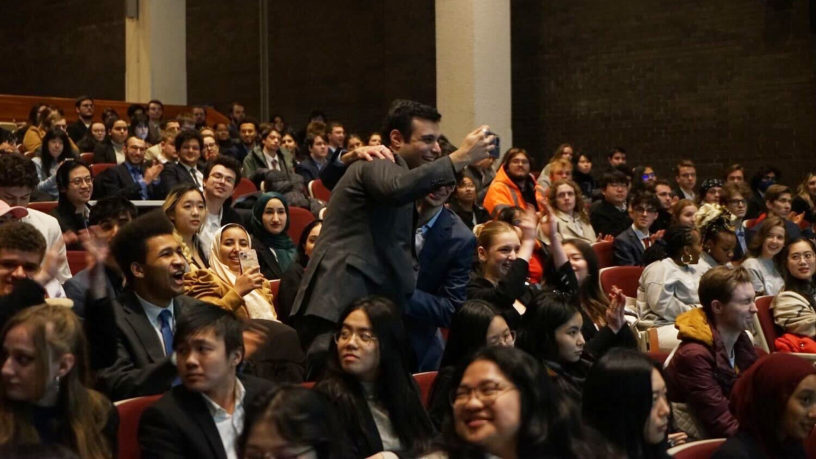
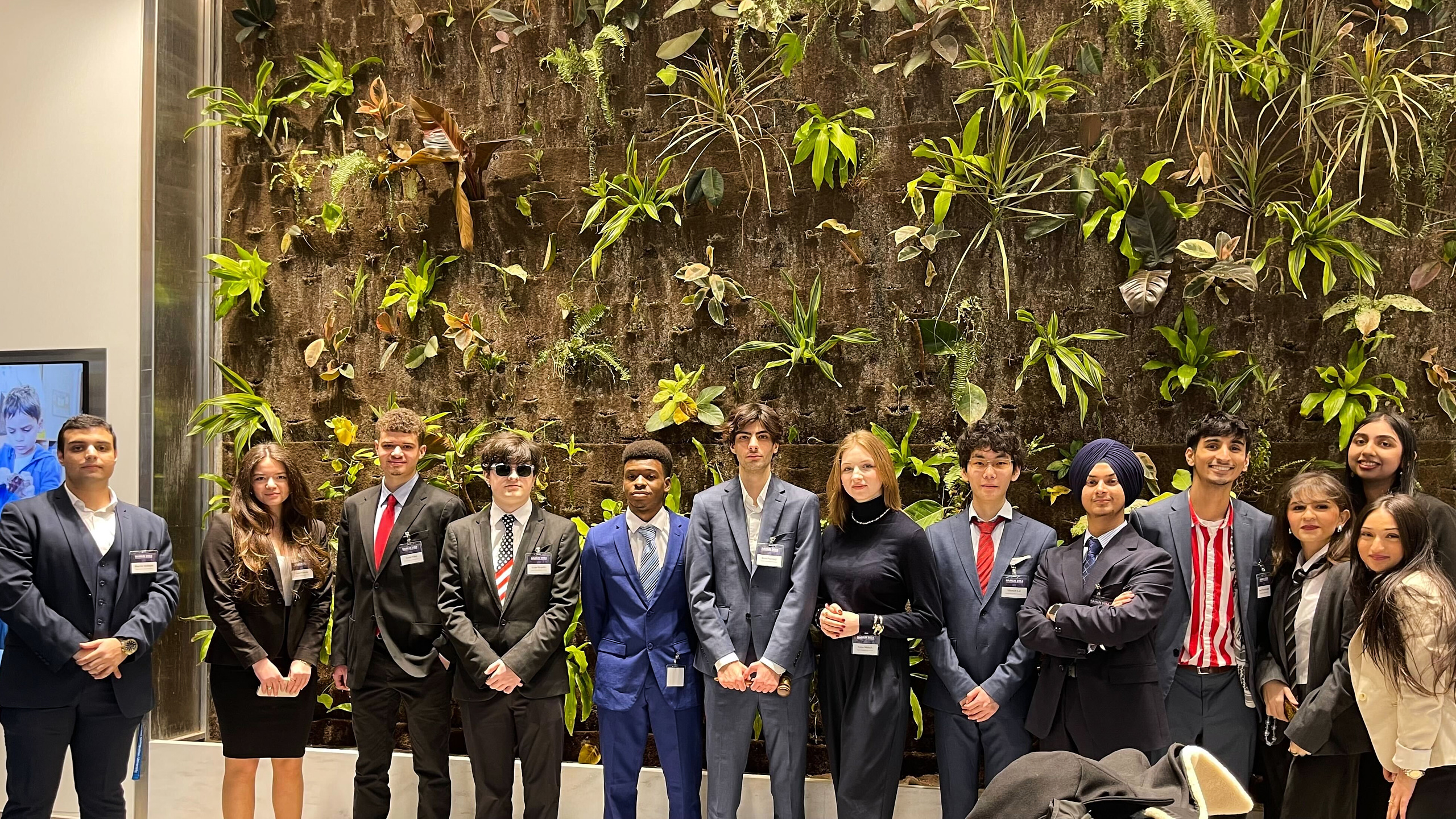
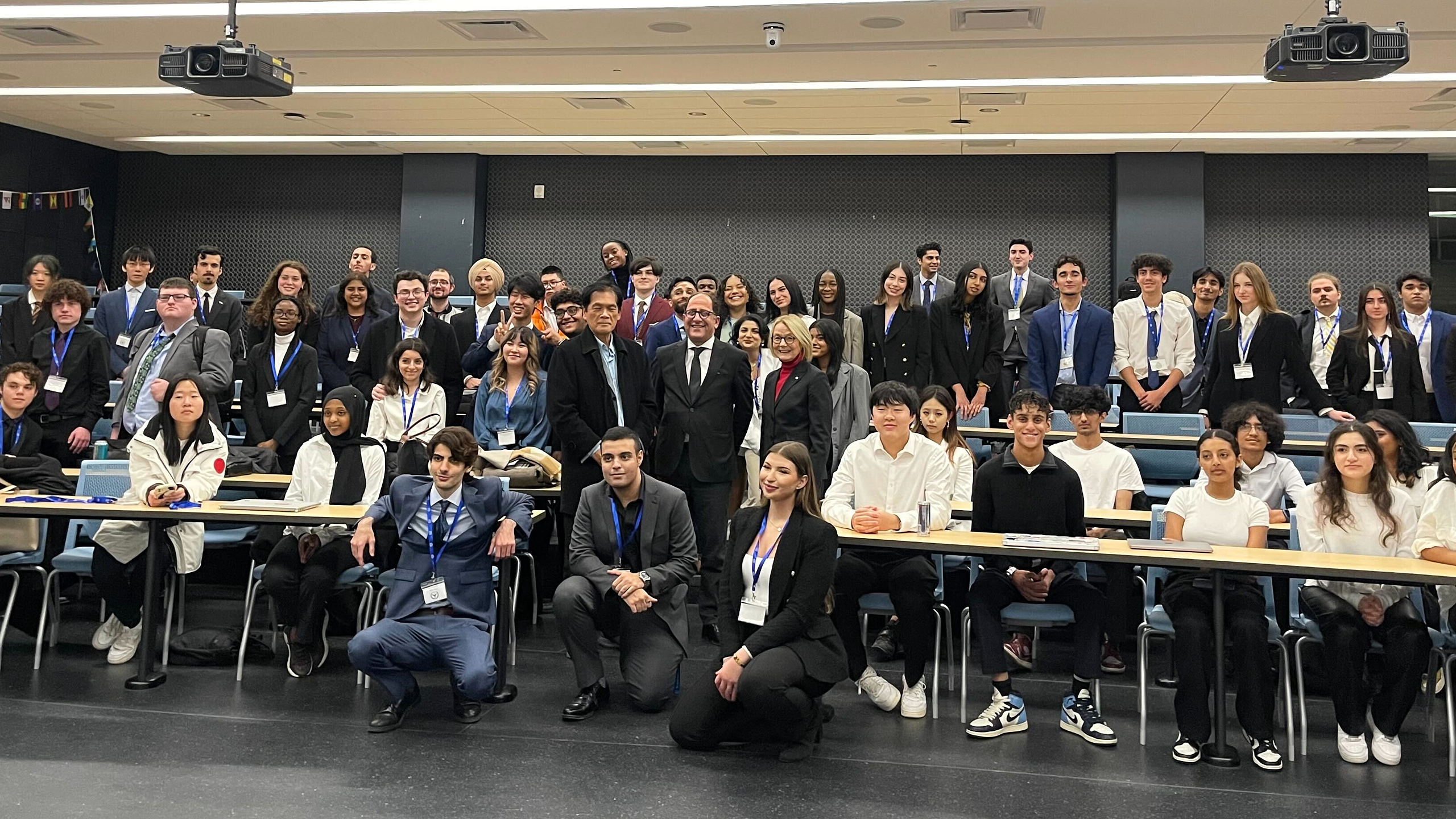
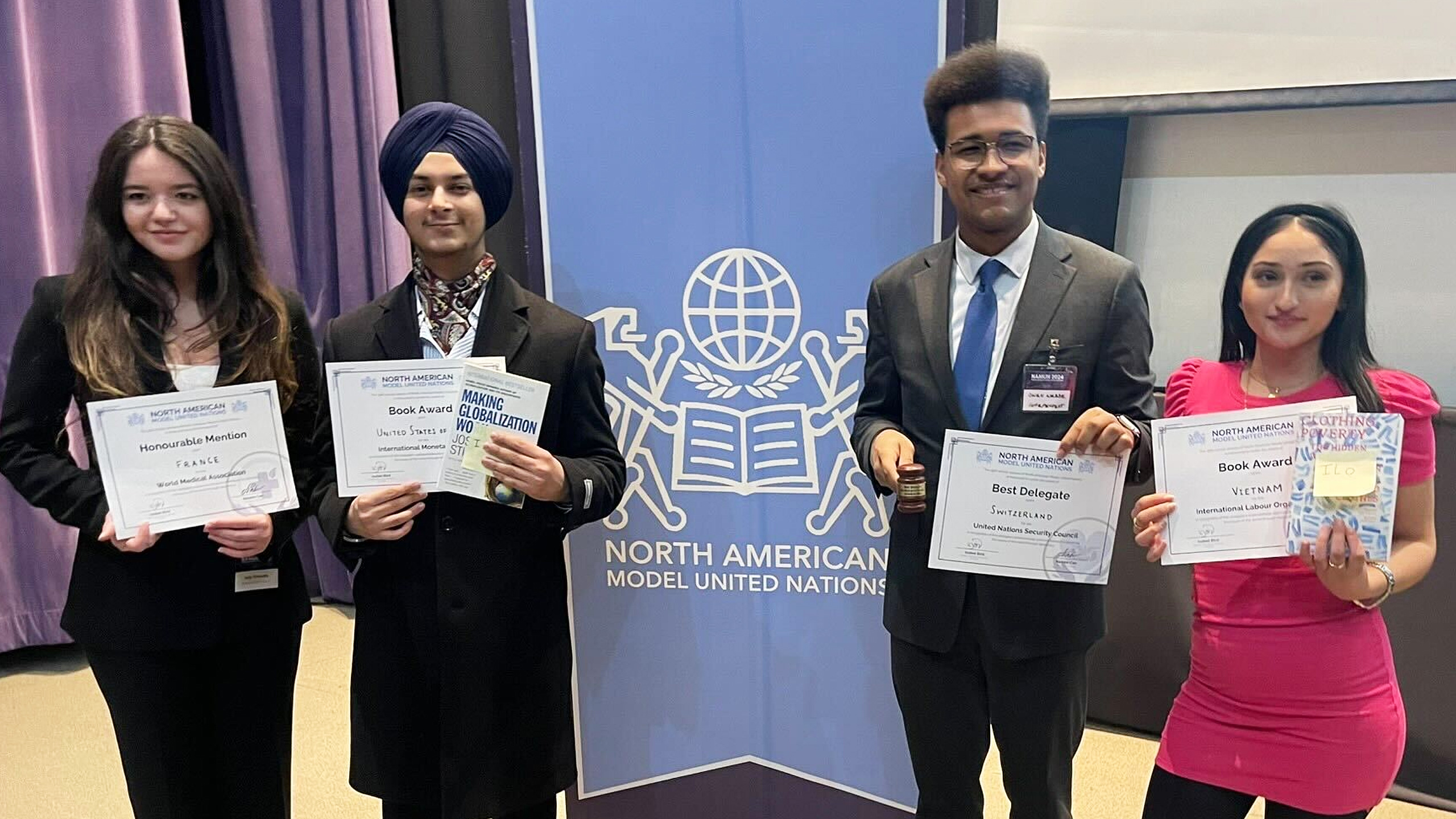
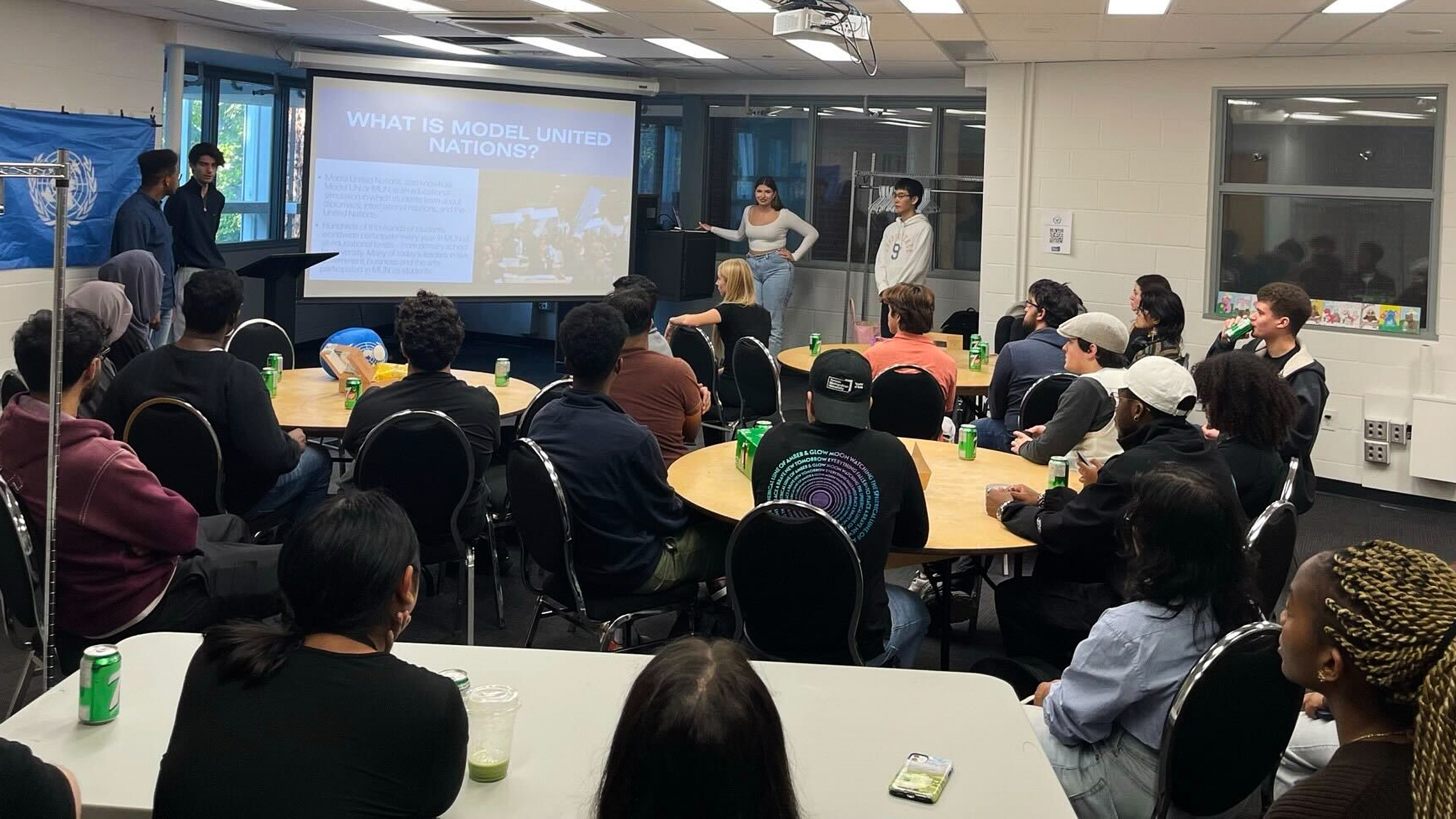








Leave a Reply